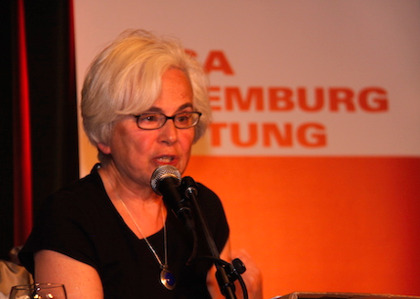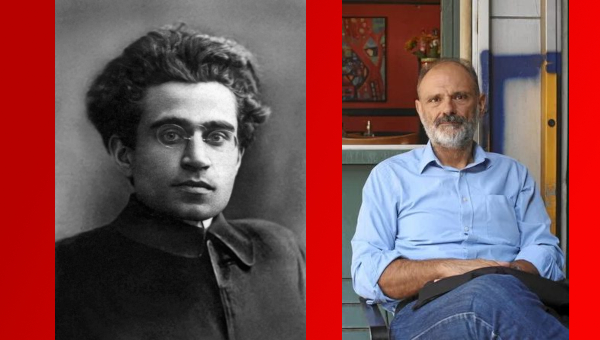In Memoriam Ellen Meiksins Wood 1942-2016
The death of Ellen Meiksins Wood on January 14, 2016 represents an immense loss for socialists everywhere. As a frequent contributor to the Socialist Register since her first essay in 1980, special co-editor of the 1995 volume on Why Not Capitalism, and a member of the Register’s editorial collective from 1996 to 2009, her depth of socialist commitment, theoretical originality and profound insight may best be gauged from this excerpt from her essay on “The uses and abuses of ‘civil society’” in the Socialist Register 1990: The Retreat of the Intellectuals.
We live in curious times. Just when intellectuals of the Left in the West have a rare opportunity to do something useful, if not actually world-historic, they – or large sections of them – are in full retreat. Just when reformers in the Soviet Union and Eastern Europe are looking to Western capitalism for paradigms of economic and political success, many of us appear to be abdicating the traditional role of the Western left as critic of capitalism. Just when more than ever we need a Karl Marx to reveal the inner workings of the capitalist system, or a Friedrich Engels to expose its ugly realities ‘on the ground’, what we are getting is an army of ‘post-Marxists’ one of whose principal functions is apparently to conceptualize away the problem of capitalism… Despite the diversity of current theoretical trends on the left and their various means of conceptually dissolving capitalism, they often share one especially serviceable concept: ‘civil society’… However constructive its uses in defending human liberties against state oppression, or in marking out a terrain of social practices, institutions and relations neglected by the ‘old’ Marxist left, ‘civil society’ is now in danger of becoming an alibi for capitalism…

What is alarming about these theoretical developments is not that they violate some doctrinaire Marxist prejudice concerning the privileged status of class. Of course, the whole object of the exercise is to side-line class, to dissolve it in all-embracing categories which deny it any privileged status, or even any political relevance at all. But that is not the real problem. The problem is that theories which do not differentiate – and, yes, ‘privilege’, if that means ascribing causal or explanatory priorities – among various social institutions and ‘identities’ cannot deal critically with capitalism at all. The consequence of these procedures is to sweep the whole question under the rug. And whither capitalism, so goes the socialist idea. Socialism is the specific alternative to capitalism. Without capitalism, we have no need of socialism; we can make do with very diffuse and indeterminate concepts of democracy which are not specifically opposed to any identifiable system of social relations, in fact do not even recognize any such system. What we are left with then is a fragmented plurality of oppressions and a fragmented plurality of emancipatory struggles. Here is another irony: what claims to be a more universalistic project than traditional socialism is actually less so. Instead of the universalist project of socialism and the integrative politics of the struggle against class exploitation, we have a plurality of essentially disconnected particular struggles.
“For socialists, it is morally and politically unacceptable to advance a conceptual framework which makes this system invisible, or reduces it to one of many fragmented realities, just at a time when the system is more pervasive, more global than ever.”
This is a serious business. Capitalism is constituted by class exploitation, but capitalism is more than just a system of class oppression. It is a ruthless totalizing process which shapes our lives in every conceivable aspect, and everywhere, not just in the relative opulence of the capitalist North. Among other things, and even leaving aside the sheer power of capital, it subjects all social life to the abstract requirements of the market, through the commodification of life in all its aspects. This makes a mockery of all our aspirations to autonomy, freedom of choice, and democratic self-government. For socialists, it is morally and politically unacceptable to advance a conceptual framework which makes this system invisible, or reduces it to one of many fragmented realities, just at a time when the system is more pervasive, more global than ever.
The replacement of socialism by an indeterminate concept of democracy, or the dilution of diverse and different social relations into catch-all categories like ‘identity’ or ‘difference’, or loose conceptions of ‘civil society’, represent a surrender to capitalism and its ideological mystifications. By all means let us have diversity, difference, and pluralism; but not this kind of undifferentiated and unstructured pluralism. What we need is a pluralism which does indeed acknowledge diversity and difference – and that means not just plurality or multiplicity. It means a pluralism which also recognizes historical realities, which does not deny the systemic unity of capitalism, which can tell the difference between the constitutive relations of capitalism and other inequalities and oppressions with different relations to capitalism, a different place in the systemic logic of capitalism, and therefore a different role in our struggles against it. The socialist project should be enriched by the resources and insights of the new social movements, not impoverished by resorting to them as an excuse for disintegrating the struggle against capitalism. We should not confuse respect for the plurality of human experience and social struggles with a complete dissolution of historical causality, where there is nothing but diversity, difference, and contingency, no unifying structures, no logic of process, no capitalism and therefore no negation of it, no universal project of human emancipation. •
- Broadbent Institute: Remembering Ellen Meiksins Wood
- Ursula Huws: Ellen Meiksins Wood – her importance to me
- John Bellamy Foster: Ellen Meiksins Wood: Some Personal Recollections
- Wikipedia: Ellen Meiksins Wood





